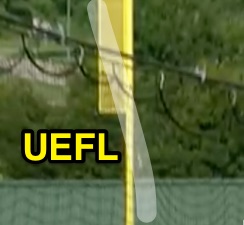 |
| Umpire Tom Hanahan ejects Manager Ayrault. |
That didn't sit well with Mudcats Manager Joe Ayrault, who intercepted Hanahan to discuss the play, believing, from his angle in the 3B Coach's box, that the ball was fair and a home run. Ayrault's chief argument appeared to be an appeal for Hanahan to consult field umpire Whiting, which Hanahan opted not to do. Ayrault continued to argue, and Hanahan ejected the sour skipper.
Key Question: Should Hanahan have consulted with crewmate Whiting—is there an obligation to do so?
Umpiring Literature/Rules: Minor League Baseball's PBUC/MiLBUD Umpire Manual contains a section entitled "Crew Consultation and Getting the Play Right" (this section also appears in the MLB Umpire Manual). This section instructs umpires as to when to seek help:
An umpire is urged to seek help when that umpire's view is blocked or positioning prevents such umpire from seeing crucial elements of a play. An umpire is also encouraged to seek help in instances when that umpire has doubt and a partner has information that could lead to a proper ruling.
 |
| Ronnie Whiting helps "rodeo clown" skip away. |
Finally, one of the PBUC/MiLBUD Manual's guidelines, in bold text, states, "6. Managers are not entitled to a second opinion simply because they dispute a call."
Philosophy: What's wrong with getting together, as the broadcaster suggests, "just for show"? The reason is two-fold, in sum. First, PBUC/MiLBUD advises against it ("There should not be a lengthy argument with the manager that is followed by a crew conference about the call"): this suggests that the managers/coaches have the ability to manipulate the crew into performing an action on their behalf to benefit their team. Umpires by definition should be impartial, a 50-50 balance. Manager manipulation essentially tips this fine equilibrium to benefit one side over the other, and this eats at the umpire's mission and impression of impartiality, while manipulation furthermore suggests that the umpire(s) can be bullied or persuaded into meeting and, ultimately, potentially ruling one way over the other.
 |
| Hanahan calls "Tilt" on Ayrault's protest. |
Second, and the Manual makes this point above, getting together shall only occur when the umpire is 1) blocked, 2) out of position for the play, 3) doubtful of his call; or 4) his crewmate spots something he does not. Though crew-savers are important on critical plays, umpires aren't exactly at liberty of considering every close play critical lest "boy who cried wolf" syndrome eats away at the crew's credibility. A similar argument is made for the case of 1) blocked and 2) out of position plays ("why weren't you in position?"), and, most obviously, 3) doubt ("how can you be unsure?").
Just because MLB now has replay as a tool doesn't mean that MiLB umpires should change how they call their game (unless we're now going to require MLBU to enforce pitch clocks simply because the minors have 'em). MLB has its own rules for replay just as MiLB has its own for consultation in a game without video review. For instance, consultation at the MLB level might be absolutely vital before going to replay while the very lack of replay in the minors might just preclude the crew from consulting frivolously.
Related Post: Crew Consultation - The Importance of the Call on the Field (6/22/17).
"Just for show" opens up a can of worms that umpires cannot afford to visit during a game.
 |
| Wilson's potential home run falls foul. |
Accordingly, Hanahan's call was not subject to a Crew Consultation pursuant to the Minor League Manual's guidelines, and Hanahan properly denied Ayrault's request for a second opinion pursuant to Guideline #6.
Quality of Correctness: For what it's worth, replays indicate the ball exited the playing field to the outside (right) and in front of the foul pole, Hanahan's call was correct.
Wrap: Frederick Keys vs. Carolina Mudcats (Class-A Advanced), 8/19/17 | Video as follows:









0 comments :
Post a Comment